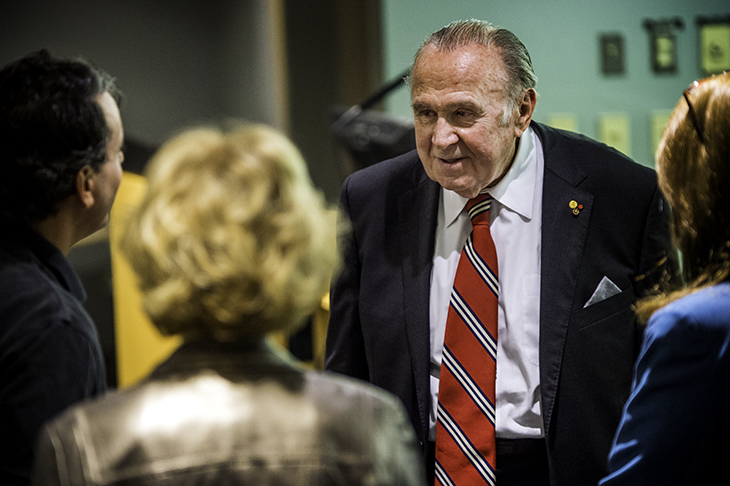Nobel Laureate comes home to Tulane

Dr. Andrew V. Schally chats with audience members who attended one of his lectures at the Tulane University School of Medicine on Nov. 12. (Photo by Ryan Rivet)
One of the Tulane University School of Medicine"s most distinguished researchers, Nobel Laureate Dr. Andrew V. Schally, came back to campus to talk about how discoveries he began decades ago at Tulane led to a Nobel Prize and major medical advances in treating hormone-related cancers.
Schally, who now lives and works in Miami, shared the Nobel Prize for Medicine or Physiology in 1977 for his discovery of the structure of key peptides produced by the hypothalamus that affected the pituitary gland and hormone production. The work opened the door to new research in contraception, cancer, diabetes, depression and other disorders.
Schally conducted grand rounds and held an afternoon question-and-answer session with students and researchers on Nov. 12. Tulane prostate cancer specialist Dr. Oliver Sartor asked whether Schally knew his peptide work would have such a profound impact on cancer treatment.
“We had no idea,” Schally said, noting that the discoveries came later in the research. “We knew it would give us a key to fertility stimulation or inhibition in humans and domestic animals, but frankly we had no idea that this would also have measured involvement in oncology that would lead to prostate cancer.”
Sartor, who was in his first year of medical school when Schally won his award, estimates that more than 10 million prostate cancer patients have been treated with therapies derived from Schally"s research.
When asked what makes a successful medical investigator, Schally said a key to his success is his drive and curiosity. He has seen many motivated by financial gain, but that doesn"t always lead to great achievements in science. The other key?
“I don"t deviate,” he said. “You must find your target. Once you get it, don"t deviate. I have a one-track mind. Or that"s what people tell me,” he said.
Schally, who has authored 2,500 research articles, worked at Tulane and the Department of Veterans Affairs in New Orleans from 1962 to 2006. He is currently the Distinguished Leonard M. Miller Professor of Pathology at the University of Miami"s Miller School of Medicine and chief of the Endocrine, Polypeptide and Cancer Institute at the Miami Veteran"s Administration Medical Center.
